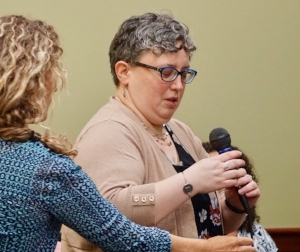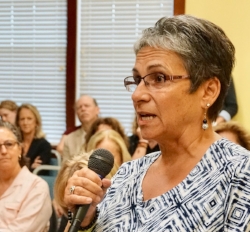DOJ, RI Ask Judge To Settle Major Dispute Over Compliance With ADA Integration Mandate
/By Gina Macris
A dispute has arisen between Rhode Island and the federal government over a key phrase in two court-approved agreements which require the state to provide people with developmental disabilities full access to jobs and community activities.
Both sides have asked U.S. District Court Chief Judge John J. McConnell, Jr. to rule soon on what it means for the state to achieve “substantial compliance” with two companion civil rights decrees signed in 2013 and 2014.
The details of the dispute focus on the first of the two agreements, which is scheduled to expire in six months – July 1,2020 – and is known as the Interim Settlement Agreement (ISA).
This agreement applies only to students and former students of the Birch Academy, a developmental disabilities program at Mount Pleasant High School in Providence which once served as a feeder for a now-defunct sheltered workshop in North Providence called Training Through Placement (TTP).
The ISA sought to resolve a finding by the U.S. Department of Justice (DOJ) that large-scale segregation of developmentally disabled youth and adults at Birch and TTP violated the Integration Mandate of the Americans with Disabilities Act (ADA). The matter became the nation’s first “sheltered workshop” settlement.
How McConnell decides to define “substantial compliance” in the context of the ISA will also impact the broader 2014 consent decree, intended to protect all Rhode Island youth and adults with developmental disabilities from a lifetime of day care or low-paying piecework.
In the ISA, both the state and the city of Providence were defendants until late September, when McConnell ended federal oversight of the city. He received glowing reports of a transformed Birch Academy, which today sends students to productive internships that broaden their experiences and sometimes result in regular jobs.
But the state still has detailed obligations under provisions of the 2013 agreement to help former Birch students and former TTP workers find jobs.
On Dec. 23, the DOJ notified McConnell that “it disputes that the state will be in substantial compliance with the Agreement” by July 1 “without a course-correcting change in the State’s approach to compliance.”
The DOJ asked the judge to direct the interim court monitor, A. Anthony Antosh, to “begin working with the State immediately to develop and implement a plan for completing the (2013) Agreement’s highly achievable remaining outcomes and schedule a status conference with the Parties in January 2020 to address next steps.”
A week later, on Dec. 30, lawyers for the state challenged the DOJ, saying the federal government has not documented its specific objections or offered a “clear working definition” of substantial compliance for either the 2013 or 2014 agreements.
The state is already working with Antosh on a definition of substantial compliance, its lawyers said. The lawyers, Marc DeSisto and Kathleen A. Hilton, asked for a formal hearing in January on the issue of substantial compliance, rather than the informal status conference requested by the DOJ.
DeSisto and Hilton said they would be prepared to submit evidence and sworn testimony that the state is meeting its responsibilities under the terms of the ISA.
The agreement itself says only that “substantial compliance is achieved when the state and the city have implemented all of the provisions of the Interim Settlement Agreement for all individuals in the target populations.”
DeSisto and Hilton wrote that “in this context, ‘implement’ means that there are mechanisms and/or policies put into effect of sufficient means to carry out its (the state’s) requirements of the particular benchmark at issue.”
For example, there remain 15 individuals protected by the ISA who have employment goals but have never been employed in the community, DeSisto and Hilton said. The reasons include poor health or challenging behavior, family resistance, legal or forensic issues with the individuals, or extended absences from service programs.
(The state’s memorandum did not specify the total number of persons counted in the ISA, but past reports from the state and the independent court monitor put the total at a maximum of about 125, with fluctuations over time.)
The state could have requested “variances” to exempt these 15 individuals from employment and remove them from the ISA caseload, the lawyers said, but officials have no interest in pursuing this route.
Instead, the state wants to meet the individuals’ needs, “where they are at this time, and (work) on an individualized basis, towards the ultimate goal of employment,” DeSisto and Hilton wrote. They said the state has ”competence” to meet the employment goals, whether or not those goals are actually reached, suggesting that this “competence” demonstrates substantial compliance.
DeSisto and Hilton asserted that the state has achieved full compliance in 52 provisions of the ISA and substantial compliance in the remaining three provisions. But their memorandum to the judge does not describe those respective provisions.
The memo also referred to findings of the previous court monitor, Charles Moseley, who in August assessed the city’s compliance with the agreement but left the state’s compliance with numerous provisions “to be determined.”
DeSisto and Hilton indicated that Moseley followed up on his findings regarding state compliance in an Oct. 1 email with a new report attached. The lawyers included what appears to be an index of Moseley’s findings in three categories; substantial compliance, noncompliance, and “to be determined”, but they did not include the Oct. 1 report itself. Nor does that report appear separately in the court file.






















